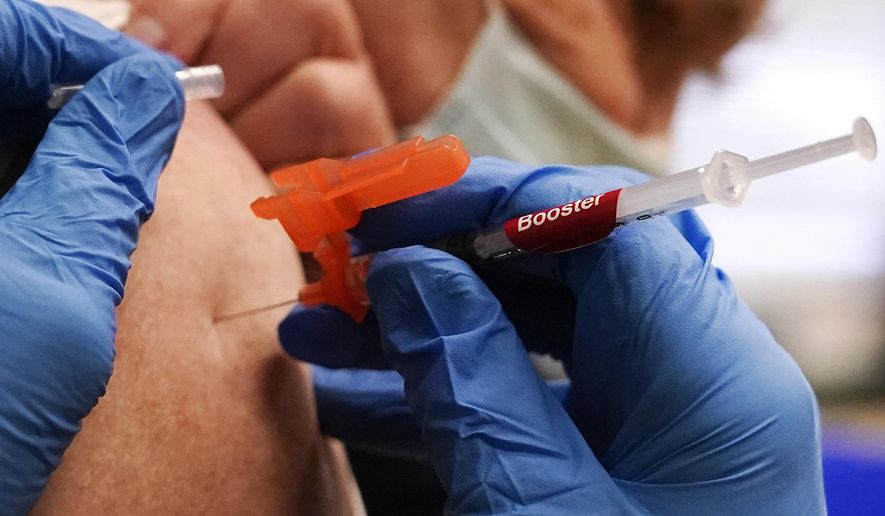The Food and Drug Administration authorized reformulated COVID-19 boosters Wednesday that target omicron variants alongside the original strain discovered in China, clearing the way for another shots-in-arms campaign to launch by next week.
Regulators said the shots from drugmakers Pfizer-BioNTech and Moderna will be a superior bulwark against disease from the BA.4 and BA.5 variants that are dominant and can evade some immune defenses.
Reported infections and hospitalizations have waned in recent weeks, but Biden officials are wary of the type of winter surges the U.S. saw in 2020 in 2021.
“As we head into fall and begin to spend more time indoors, we strongly encourage anyone who is eligible to consider receiving a booster dose with a bivalent COVID-19 vaccine to provide better protection against currently circulating variants,” FDA Commissioner Robert M. Califf said.
The Centers for Disease Control and Prevention is scheduled to debate the new boosters and issue a recommendation in favor of them later this week, meaning the booster shots could be available shortly after Labor Day.
The Pfizer version is authorized for ages 12 and older and the Moderna one is authorized for 18 and up.
People are eligible for the retooled booster if it has been at least two months from their primary vaccination series or last booster. Providing space between vaccinations allows for a proper immune response and reduces the risk of myocarditis, or inflammation of the heart muscle, which has been detected in some COVID-19 vaccine recipients.
The FDA is no longer authorizing the original vaccines as boosters, though they will remain available for the primary series.
The FDA relied on real-world data from the use of prior COVID-19 shots and non-clinical data from the lab to authorize the variant-specific shots for emergency use, rather than waiting for full data from human trials.
Regulators said the shots contain the same basic ingredients as the first edition of COVID-19 vaccines but were updated to combat BA.4/5 the variants, akin to how scientists use a similar process to fine-tune flu vaccines every year to match circulating strains.
“The FDA has extensive experience with strain changes for annual influenza vaccines. We are confident in the evidence supporting these authorizations,” said Peter Marks, director of the FDA’s Center for Biologics Evaluation and Research.
The decision to upgrade the vaccines reflects the wily nature of the coronavirus, which has mutated many times since its discovery in Wuhan in late 2019.
Omicron and its spinoffs are fast-moving and have infected many Americans who avoided the virus earlier in the pandemic, though they do not appear to attack the lungs as harshly as previous variants. Also, the global population has built up stores of immunity from prior infections and vaccine shots, which confer some level of protection against the new variants.
Advisers to the FDA felt it was wise to update the vaccines, however, to better match them to circulating variants.
“The hope here is that by increasing the amount of antibodies we have to that particular variant, we will restore the kind of protection that we had when we first saw these vaccines launched in the late part of 2020 and early part of 2021, where we had very good protection against symptomatic disease,” Dr. Marks said. “The idea here is not just to increase the antibodies right now but also to hopefully give us a longer duration of protection.”
The White House is expected to push Americans to stay up to date on their booster shots in a bid to avoid another crushing surge around the holidays.
For many, the fall campaign with BA.4/5 shots would be the second booster.
Americans 50 and older have been eligible for a second booster shot for several months but many younger persons haven’t had a booster since late 2021 or the first months of this year because of eligibility rules.
It is unclear how much of the general population will snap up the new shots. Slightly less than half of those fully vaccinated — or roughly a third of the U.S. population — have opted to get an initial booster shot.
Dr. Califf bemoaned those lackluster stats, saying people who remain up to date on boosters are less likely to die from the virus.
“This is a remarkable opportunity to improve our life expectancy and reduce the toll and mortality in our population,” he said.
For more information, visit The Washington Times COVID-19 resource page.
• Tom Howell Jr. can be reached at thowell@washingtontimes.com.




Please read our comment policy before commenting.